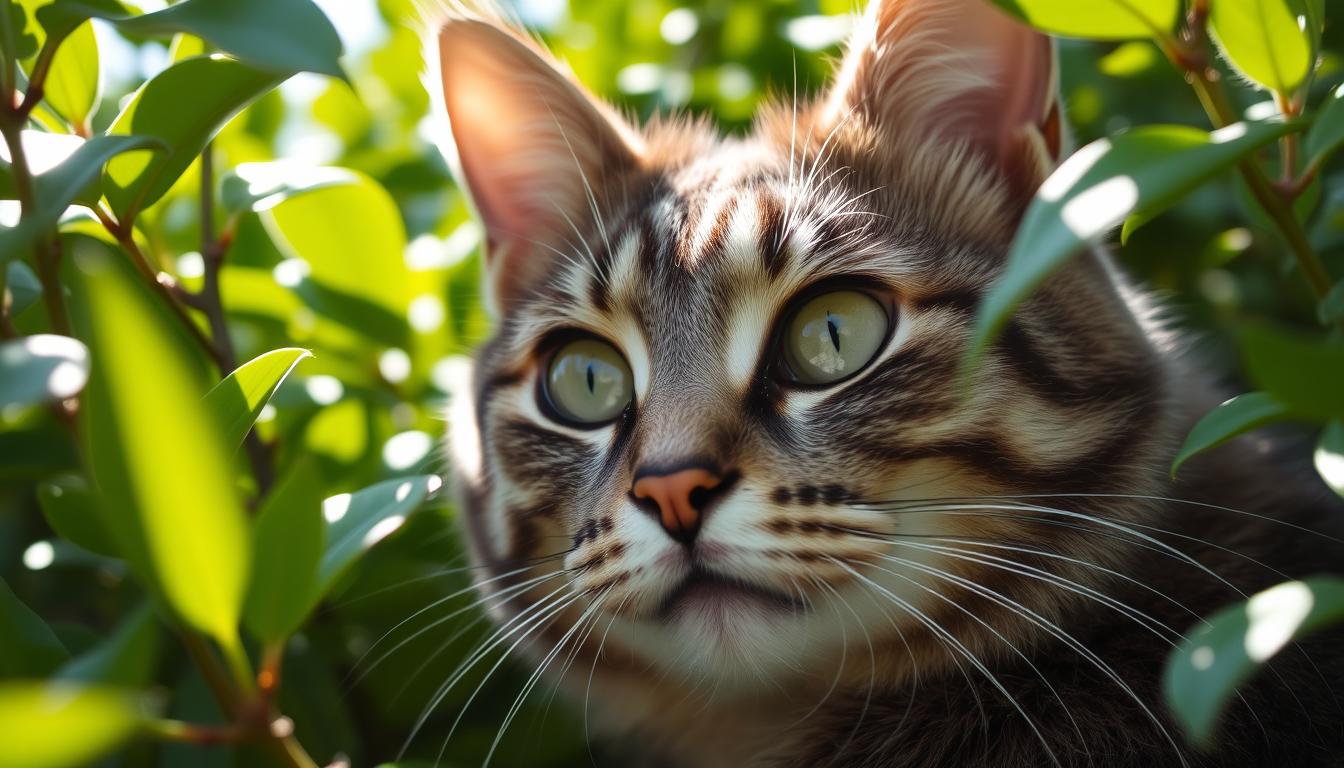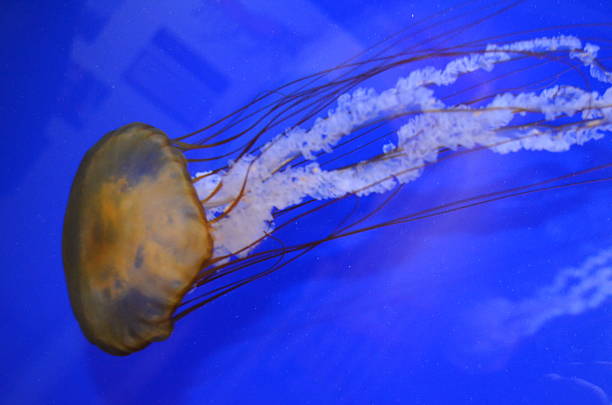Tamed Budgies, Cockatiels, and Lovebirds: Legit or Not?
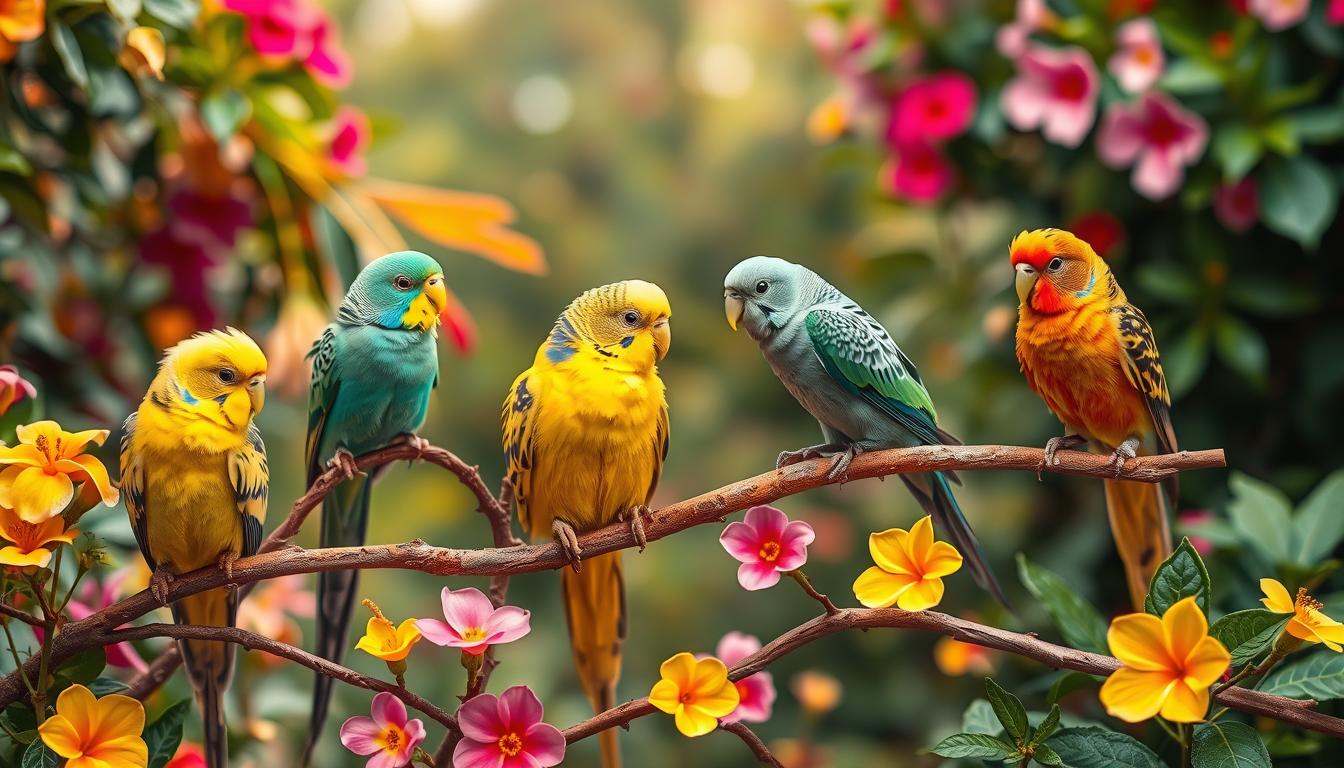
Thinking about getting a tamed budgies, cockatiels, and lovebirds? You might wonder if it’s a good idea. The truth depends on their behavior and needs. You can learn more by visiting tamed budgies cockatiels and lovebirds is it legit or, where you’ll find the good and bad sides of having them as pets. They can be loud and their behavior changes as they grow1.
Having a bird as a pet is a big responsibility. It takes a lot of work and training. It’s important to remember that each bird is unique, with its own personality2. This is key when deciding to welcome a tamed budgies, cockatiels, and lovebirds into your home.
Key Takeaways
- Understanding the behavior and needs of tamed budgies, cockatiels, and lovebirds is crucial before bringing them home.
- These birds can be loud and exhibit changing behavior as they grow1.
- Birds’ personalities vary greatly, and each bird is an individual2.
- Training and bonding with a bird may take months or even years to achieve desired behaviors2.
- There is no specific bird species that possesses all the desired traits right from the start2.
- Rehomed birds will need time to readjust to a new owner’s personality and environment2.
Understanding Pet Bird Domestication
When thinking about pet bird taming, it’s key to know birds aren’t domesticated like dogs or cats. They don’t naturally want to please humans3. Animallover03 says birds are best picked by meeting several and letting one choose you. This shows how important bird behavior is in taming them.
Understanding their natural social behaviors is crucial in domesticating birds. Some birds, like Lovebirds, are very social and need lots of attention4. Others, like Canaries, are more alone and do well in smaller spaces with less interaction4.
Here are some key factors to consider when domesticating birds:
- Provide a suitable environment that mimics their natural habitat
- Offer a balanced diet that meets their nutritional needs
- Ensure adequate social interaction and attention
By knowing these factors and tailoring your approach to your bird’s needs, you can build a great bond. This bond is based on trust and mutual respect3.
| Bird Species | Weight | Length | Lifespan |
|---|---|---|---|
| Parakeets (Budgies) | 1 ounce | 6-8 inches | 7-15 years |
| Cockatiels | 3 ounces | 12-13 inches | 15-20 years |
Remember, every bird is different. Knowing their bird behavior is key for successful taming4.
Species-Specific Taming Potential
When taming birds, knowing their species is key. Lovebirds are playful but can be nippy5. Some lovebirds, like Flamingo’s mom’s, are quiet and gentle5. It’s important to understand these traits for good bird care.
Cockatiels learn by watching and need trust5. They love being around people. Budgies, or parakeets, are great with families and tame fast with care6. Knowing these differences helps you care for your bird better.
Taming two birds is harder than one5. Train them in a quiet room, with short sessions often5. By understanding your bird’s needs, you can tame them and bond strongly, using effective bird care tips.
The Truth About Tamed Budgies, Cockatiels, and Lovebirds: Is It Legit or Not
When choosing tamed bird housing, it’s key to know what each bird needs. For example, a parakeet (budgie) weighs about 1 ounce and can live 7-15 years with good care4. A cockatiel, however, can live up to 15-20 years and needs a bigger space to be happy4. Knowing these needs helps you pick the best home for your bird.
Experts say it’s important to let female pet birds show their natural behaviors7. Good food and care can make them happier and safer when they lay eggs7. When picking tamed bird housing, think about your bird’s social and emotional needs too.
Some people worry about the cost of tamed birds. But the price shows how much care the bird has gotten8. For instance, a hand-reared macaw can cost over $5,000, while a cockatiel might cost up to $250AU if it’s well cared for8. When looking at tamed bird housing, find reputable breeders and think about what your bird needs.
For more tips on tamed bird housing and care, check out this forum. It’s filled with advice from experienced owners and breeders. With the right care, your tamed bird can live a happy, healthy life.
Essential Requirements for Successful Bird Taming
When taming birds, bird enrichment activities are key for their well-being. Tanna says cockatiels are great, but lovebirds can be unpredictable9. To help your birds, you must meet their specific needs. Toys and foraging activities can keep parrots happy and engaged9.
Adele notes that lovebirds can talk, but they’re not the best at it. Yet, with the right training, they can be very loving. It’s vital to offer a range of bird enrichment activities to keep them happy. About 80% of parrots, like cockatiels, may take months or years to trust their owners9.
Here are some key considerations for successful bird taming:
- Providing a balanced diet that meets your bird’s nutritional needs
- Creating a safe and comfortable environment that encourages exploration and play
- Offering a variety of bird enrichment activities to stimulate mental and physical health
- Establishing a routine that includes regular socialization and training sessions
By following these guidelines and caring for your birds, you can build a strong bond. Remember, each bird is different. With patience and the right approach, you can create a happy home for your feathered friends9.
Building Trust with Your Pet Bird
Building trust with your pet bird is key. Experts say it takes time and effort10. Animallover03 notes that birds can tell people apart and trust takes months or years10. To bond well, you must understand bird behavior and make a welcoming space.
Begin by offering treats and being comforting. As you get better, teach your bird simple commands11. Also, learn to read your bird’s body language to meet their needs and feelings. This helps build a strong bond, crucial for pet bird taming.
For instance, when a tamed budgie feels safe enough to fly around, it shows trust11. A deep bond through training and spending quality time improves your relationship with your budgie11. With these steps and patience, you can foster a trusting relationship with your bird, vital for bird behavior and pet bird taming success.
Remember, gaining your bird’s trust is a journey that requires patience and effort. But the rewards are worth it. With the right approach and understanding, you can forge a lasting bond with your pet bird. For more tips on bonding with your bird, check out pet bird care websites.
Creating the Ideal Environment for Tamed Birds
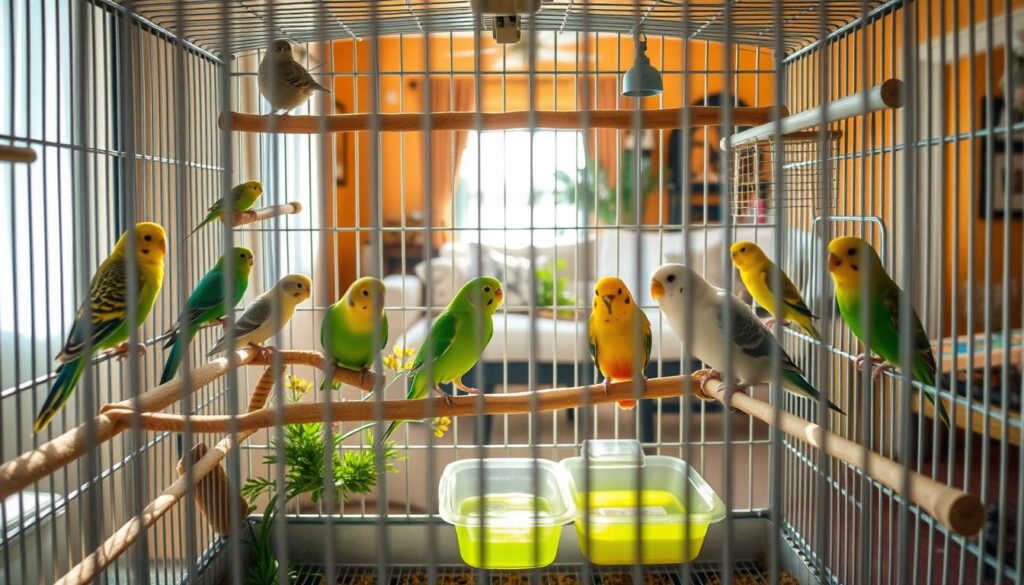
Creating a great home for tamed birds means focusing on tamed bird housing and bird care tips. Experts say the aviary should be at least four times the size of the biggest bird’s wingspan12. This space is key for their flying and exercise, keeping them happy and healthy.
It’s also vital to think about your birds’ social needs. Birds like lovebirds are very active and need lots of play and interaction12. You can add toys and other birds to the aviary. Spending time with your birds and doing activities like target training helps strengthen your bond13.
The aviary should also have good ventilation, insulation, and heating12. The temperature should be between 12 and 26°C for tropical birds12. Plus, the lighting should be like natural daylight, with some birds needing UVA and UVB lights for their health12.
Here are some important bird care tips for a great home for your tamed birds:
- Give them at least six hours outside of their cage each day for exercise12
- Start introducing birds to the aviary slowly, with short, supervised sessions12
- Feed them a balanced diet with pellets, veggies, and fruits, with seeds as treats13
By using these bird care tips and meeting your birds’ needs, you can make a perfect home for them1213.
Daily Care and Maintenance of Tamed Birds
As a bird owner, it’s key to give your pet the right care. This means a balanced diet, watching their health, and making sure they get enough exercise. Most birds come from pet shops, so early care is crucial14.
Knowing how your bird behaves helps you create a great home for them. For instance, cockatiels can live up to 20 years in captivity15. They need a cage that’s at least 24 inches wide for flying15. A varied diet of fruits, veggies, seeds, pellets, and fresh water is also important15.
Some important daily care steps include:
- Feeding a balanced diet
- Monitoring health and watching for signs of illness
- Providing adequate exercise and mental stimulation
By following thesebird care tipsand understandingbird behavior, you can ensure your bird is happy and healthy.
Every bird is different, so it’s important to tailor your care to their needs. With the right care, you can have a strong bond with your bird and enjoy a rewarding relationship14.
| Bird Species | Average Lifespan | Dietary Requirements |
|---|---|---|
| Cockatiels | 15-20 years | Fruits, veggies, seeds, pellets, and fresh water |
| Budgies | 10-15 years | Seeds, pellets, fruits, and veggies |
Behavioral Challenges and Solutions
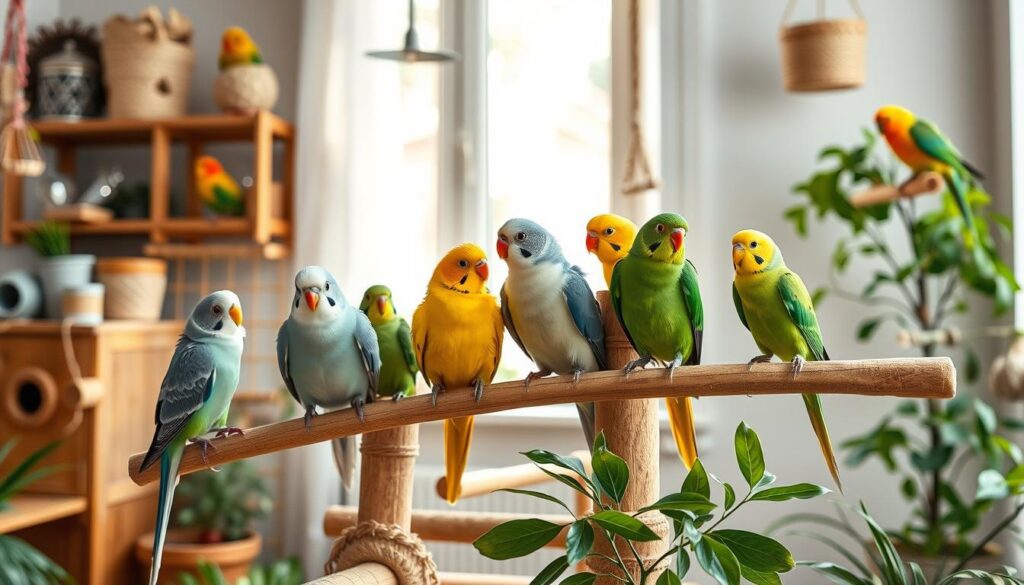
Understanding bird behavior is key when taming pet birds. You might face various challenges that need patience and smart solutions. Tanna says cockatiels are great, but lovebirds can be unpredictable16. This unpredictability makes training and socializing them tough.
Adele notes that lovebirds can talk, but they’re not the best at it16. This shows why picking the right bird species is important. If you want a bird that talks well, choose a different species. Knowing your bird’s needs is crucial for a good relationship.
Common Training Issues
Training problems include screaming, feather plucking, and aggression. These can stem from lack of socialization, boredom, or health issues. To fix these, find the cause and tailor a solution. For example, a stimulating environment with toys can reduce boredom and stress.
Recognizing stress signs like pacing, screaming, or feather plucking is vital. Addressing these quickly helps your bird be well-behaved and happy. A discussion on cockatiel care suggests using the “Step Up” command to train birds to step onto hands17. This builds trust and strengthens your bond.
Problem-Solving Strategies
To tackle behavioral challenges, you need effective strategies. This might mean getting advice, trying different training methods, and being patient and consistent. Working with your bird and solving problems positively can build a strong bond. Key for owners is providing a good environment, socialization, and mental stimulation for healthy behavior17.
| Behavioral Challenge | Solution |
|---|---|
| Screaming | Provide a stimulating environment and plenty of attention |
| Feather plucking | Address underlying medical issues and provide a balanced diet |
| Aggression | Establish trust and use positive reinforcement training techniques |
Understanding bird behavior and solving problems effectively can make your pet bird happy and well-behaved. Always put your bird’s needs first and create a nurturing environment for their growth and development.
Long-Term Success Stories and Expectations
Thinking about getting a tamed budgie, cockatiel, or lovebird? It’s a big commitment. Experts say caring for these birds takes a lot of work and training18. With the right approach, you can build a strong bond. But, it’s important to know the challenges and what to expect.
Creating a great home for your bird is key. This means a balanced diet, lots of exercise, and a safe, fun space. By following bird care tips, your bird will be happy and healthy. For example, Grey parrots need lots of time out of their cage for their health18.
Here are some tips for a successful long-term relationship with your bird:
- Provide regular social interaction and training
- Give a varied and nutritious diet
- Create a safe and engaging environment
- Stay aware of health issues and prevent them
By following these tips and caring deeply for your bird, you’ll enjoy a rewarding relationship. Remember, bird ownership is a journey that needs patience, dedication, and a willingness to learn19.
The secret to success with your bird is understanding the responsibilities and challenges. Being informed, prepared, and committed to the best care will ensure your bird’s happiness and health. And, you’ll get to enjoy the many benefits of owning a tamed budgie, cockatiel, or lovebird18.
Conclusion: The Reality of Bird Taming Success
Throughout this guide, you’ve learned about the complex world of pet bird taming. Building a bond with birds like budgies, cockatiels, and lovebirds is possible. But, success depends on several important factors20.
Understanding each bird’s behavior and social needs is crucial. Patience, consistency, and a positive training approach are key. They help build trust and teach basic skills20.
Creating the right environment for your bird is also vital. Avoiding mistakes like misusing cage covers is important. It helps prevent behavior and health problems21.
Deciding to own a bird means understanding the commitment and responsibilities. By following this guide, you can have a rewarding experience with your bird20.
FAQ
Can budgies, cockatiels, and lovebirds be successfully tamed?
What are the common misconceptions about taming these birds?
What are the key factors for successful bird taming?
How can I create an ideal environment for a tamed bird?
What are the daily care and maintenance requirements for tamed birds?
How can I address behavioral challenges with a tamed bird?
What are the long-term expectations and success stories for tamed birds?
Source Links
- https://agp.boards.net/thread/2394/canary-lovebird – Canary vs. Lovebird | African Grey Parrot Boards
- https://forums.avianavenue.com/index.php?threads/which-bird-should-i-get-cockatiel-green-cheek-conure-budgie-or-male-lovebird.190825/ – Which bird should I get? Cockatiel, Green Cheek Conure, Budgie, or male lovebird?
- https://pmc.ncbi.nlm.nih.gov/articles/PMC7927005/ – The Sustainability of Keeping Birds as Pets: Should Any Be Kept?
- https://www.tracyvets.com/site/blog/2021/08/30/types-of-pet-birds – Paws and Claws Veterinary Hospital
- https://www.talkcockatiels.com/threads/taming-a-pair.10696/ – Taming a pair
- https://www.petmd.com/bird/7-best-pet-bird-species – 7 Best Pet Bird Species
- https://www.talkcockatiels.com/threads/help-budgie-mating-with-cockatiel.81850/ – Help! Budgie mating with Cockatiel
- https://codylwrites.com/2020/06/05/scams-misinformation-and-adopting-the-perfect-bird/ – Scams, Misinformation and Adopting the Perfect Bird
- https://birdtricksstore.com/blogs/birdtricks-blog/taming-a-pet-shop-bird?srsltid=AfmBOoqB6fgPIswz3EpxkQDiZOdmyJDjprtims31zPMsFf5xbOddnwqb – Taming a Pet Shop Bird
- https://www.parrotforums.com/threads/losing-budgies-trust.76284/ – Losing Budgie’s Trust
- https://www.birdcagesnow.com/blogs/bird-blog/5-steps-to-get-your-budgie-to-love-you – Make Your Budgie Love You – Training Your Parakeet To Feel at Home With You in 5 Easy Steps
- https://www.rspca.org.uk/adviceandwelfare/pets/birds/environment – Housing and Environments for Pet Birds – RSPCA – rspca.org.uk
- https://forums.avianavenue.com/index.php?threads/my-lovebirds-are-terrified-of-me-and-fly-away-whenever-i-come-near-them-how-do-i-tame-2-lovebirds.274314/ – My lovebirds are terrified of me and fly away whenever i come near them (how do i tame 2 lovebirds)
- https://www.parrotforums.com/threads/big-box-budgie-vs-hand-raised.72030/ – Big box budgie vs. hand raised
- https://myrightbird.com/articles/a-guide-to-understanding-and-caring-for-your-pet-cockatiel – A Guide to Understanding and Caring for Your Pet Cockatiel | myBird
- https://forums.avianavenue.com/index.php?threads/bird-loss-chronic-egg-laying-potiential-species.297362/ – Bird Loss, Chronic Egg Laying & Potiential Species
- https://www.talkcockatiels.com/threads/is-cockatiel-care-different-than-budgie-care-i-need-help.9862/ – is cockatiel care different than budgie care ? i need help!
- https://forums.avianavenue.com/index.php?threads/do-handfed-birds-make-good-breeders.78114/ – Do Handfed Birds Make Good Breeders?
- https://birdtricksstore.com/blogs/birdtricks-blog/a-bird-owner-s-guilt?srsltid=AfmBOoqEZGU0bLXKMkZq1tp7eNvKBBQ1SQNEpH7nSFb6aZBbgBS-rnWz – A Bird Owner’s Guilt
- https://trainedparrot.com/index.php?tag=Step up – Trained Parrot – Blog Articles About Training Parrots Tricks
- https://birdtricksstore.com/blogs/birdtricks-blog/should-you-cover-your-bird-s-cage-at-night?srsltid=AfmBOoqjNYHZ75TZsP0qIqHzZ6Bg3MBde61btqopf826yW2axmjsXeq4 – Should You Cover Your Bird’s Cage at Night?


